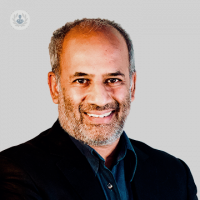Why do people need hip replacement surgery?
Written in association with:Hip replacement surgery is one of the most common joint replacement surgeries and it’s on the rise. But why exactly do people need this operation and are there certain medical conditions triggering this increase? To find out, we asked Mr Pramod Achan, a consultant orthopaedic surgeon based in London, specialising in hip and knee surgery:

How is hip replacement surgery performed?
Hip replacement surgery is performed under general or regional anaesthesia. The hip is approached via an incision on the side or front of the hip joint. The damaged ball and socket are then removed and replaced with an artificial joint, usually made from a metal stem and shell with a ball and socket bearing surface. The exact nature of the implants used depends on patient factors, such as age and functional demand, as well as the quality of the host bone.
Why do people need hip replacements?
People need hip replacements because their native joints have been worn away to the point at which they cannot be salvaged. Their joints also cause severe daily pain and restriction of daily activity.
Most of the time, a patient will have tried more-conservative treatments before that haven’t helped or are no longer effective.
When a patient opts to have a hip replacement, it’s usually because they are experiencing the type of pain that:
- Gets worse when walking
- Limits your ability to walk up and down the stairs
- Stops you sleeping properly
- Affects your ability to stand up from a seated position
- Remains even when taking pain medication
This type of pain is often caused by various medical conditions that over time damage the joint. The most common include:
- Rheumatoid arthritis
- Osteoarthritis
- Osteonecrosis
How long does it take to recover from hip replacement surgery?
With today’s techniques, some patients can have hip replacements as a day case operation. However, the large majority stay in the hospital for two to three days. They can then leave being independently mobile with crutches or sticks and able to climb stairs on their own.
Over time, they continue to increase their activity, often abandoning all walking aids within six weeks. At this point they can return to all daily activities including driving.
It is important to state these are average milestones and each patient recovers at their own speed and always under the guidance of their surgeon and physiotherapist.
Is the patient able to be fully active again?
Yes, the intention is for patients to return to full activity. Although it is important to be sensible with an artificial joint, the patient can expect to return to 18 holes of golf, playing competitive tennis and skiing on the piste!
If you are experiencing persistent hip pain and want to discuss a hip replacement with a doctor, visit Mr Pramod Achan’s Top Doctors profile and book a consultation with him.


